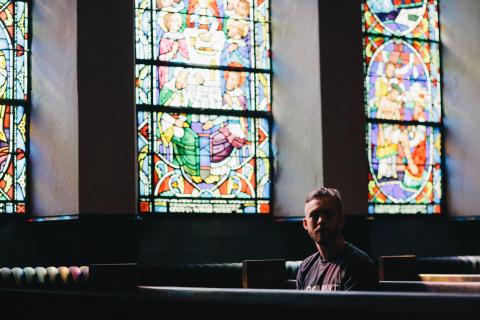We Desperately Need a New Vision of the Laity

We Desperately Need a New Vision of the Laity
On Sunday my wife and I passed a beautiful statue of Our Lady holding the Christ child. Below it was a plaque with the inscription “In Thanksgiving for Our Priests."
My wife commented on how striking it was, and I agreed, both with the beauty and the sentiment. But I added:
“Wouldn't it be amazing to see a statue like that honouring the laity?”
At first she laughed. Then she got a bit emotional.
“Yes. Oh man, we so badly need to think differently about ourselves as lay people."
First, a disclaimer.
I deeply love our priests. It is a point of deep family pride that so many priests came from the Canning clan (8 priests that I know of, and at least 6 nuns!). The role of the priest is crucial and indispensable in the Church. The dignity and sanctity of the ordained priesthood is, as Russel Shaw says, of a "radical and ontological difference from the baptismal priesthood of the faithful.”
So please let know one think that I am saying that we need to esteem our priests less highly. I am absolutely and unequivocally not saying that. We need to honour, cherish, pray for and love our priests.
But I am going to speak about something very important and often misunderstood: clericalism.
I used to regard this term itself with suspicion, probably because I heard it used by people advocating for women priests, something the Church has clearly spoken on (Hint: it’s impossible). And the word has been used with different connotations in different contexts, and that’s something we need to be aware of when speaking about it.
But this is the clericalism I am talking about.
"In general terms, it’s an attitude, a state of mind that takes the clerical vocation and state in life to be both superior to and normative for all other Christian vocations and states. Clerics (primarily bishops and priests, and to a lesser extent deacons) are the active, dominant element in the Church. It’s they who (by nature, as it were) make the decisions, give the orders, and exercise command. In this scheme of things, the role of the laity is to receive the orders and, if they’re faithful members of the Church, do as they’re told."
Shaw goes on to note the reality that Church is heirarchically organized, citing Paul’s image of a body with many parts.
"But clericalism is an abuse that distorts and misrepresents this ideal of complementarity by reducing it to a caricature: clerics are bosses, lay people get bossed. This is hardly encouragement for the laity to assume their God-given roles in the apostolate (the Church’s mission of preaching Christ’s good news to the world)."
In other words, clericalism in its true sense is impeding the work of the Church in the world. So we need to kick it out.
Here are 4 crucial steps we can take to kick clericalism to the curb:
1) Accept that clericalism exists and has affected most of us in some way
Clericalism affects priests and lay people alike, and it’s reverberations are felt throughout the Church.
Shaw likens a clericalized culture to a sick man, whose symptoms are so consistent that he eventually assumes that being sick is just normal and stops paying attention to what is wrong.
The first step to curing an illness is admitting that being sick isn’t normal.
Because clericalism affects both priests and lay people, in my mind the question to ask isn’t “Is my parish or group clericalized?”; it is, “How much is it so?"
2) Put people into roles according to their giftedness, not according to need alone
The CCCB recently released a document called The Co-Responsibility of the Lay Faithful in the Church and the World. It says:
"The lay vocation is always devalued when this clericalization takes place, whether by treating lay people as inferior (a problem more common several generations ago) or by charging them with tasks and characteristics proper to the clergy (something more common in our day). The great call of the laity, however, is fundamental to the Church’s mission and cannot be abrogated: it is to bring Christ to the world from within; to evangelize it from the inside out."
To be completely frank, I still see both of these devaluations operating today. On one hand (treating lay people as inferior), you see it when lay people are not utilized in areas where their gifts or expertise would be of great benefit to the diocese or parish.
To see the Church operating at a lesser level than it could because the talents of the laity are not being stewarded is a tragedy!
To see the Church operating at a lesser level because the talents of the laity aren't being stewarded is a tragedy!
On the other (charging them with tasks proper to the clergy), you see it in lay people feeling that taking on liturgical roles- altar server, lector, Extraordinary Ministry of Holy Communion, etc.- is the extent of their contribution to the mission of the Church. Priests and laity who accept this idea engage in what Pope Francis calls a “sinful complicity.”
"It is one of the evils, one of the evils of the Church. But it is a ‘complicit’ evil, because priests take pleasure in the temptation to clericalize the laity, but many of the laity are on their knees asking to be clericalized, because it is more comfortable, it is more comfortable! This is a double sin!"
Instead, lay people should feel the joy of contributing their God-given gifts to the good of the Church and world. Visionaries should contribute their vision. Strategizers should contribute their strategy. Gifted speakers should be able to speak. Counsellors should counsel. Teachers should teach, and administrators should administrate.
All of these things and more are present in our people, and they should be utilized in the mission.
Happily, some churches have begun to offer strengths and charisms workshops to help parishioners better understand their giftedness and how to better contribute to the mission of their parish. This is a crucial step.
3) Encourage the laity to see their role as a VITAL one, not just that of a helper or assistant
Pope Benedict proposed a new way of thinking about how priests and lay people work together: co-responsibility.
"Co-responsibility demands a change in mindset especially concerning the role of lay people in the Church. They should not be regarded as ‘collaborators’ of the clergy, but rather as people who are really ‘co-responsible’ for the Church’s being and acting."
I believe that this entails a deep reflection on where responsibility is being exercised. It’s not about power; constantly seeking more power in the church is a act of pride. But we can ask: how are we entrusting our people with responsibility? Responsibility for the evangelizing mission of the Church; for the pastoral care of others; for vision and plans for our parish; for the building up of leaders for the Church and for the world.
Priests are vital to this process, and our lay people need to realize that they are as well.
4) Establish a culture of accountability
I would even go so far as to propose something else in addition to co-responsibility: co-accountability.
What if laity and priests alike felt accountable to one another? What if we allowed ourselves to be close enough to each other that we could report to one another, seek help from one another, support one another, even... correct one another?
Is this too radical? I don’t know. But I know that love makes radical things possible.
Fundamentally, clericalism must be rooted out because it impedes the mission of the Church. And even the work of rooting it out will require co-responsibility.
Then maybe we will see some beautiful Marian statues in thanksgiving for the priesthood that happen to sit beside statues of St. Joseph in thanksgiving for the laity.
Wouldn't that be a happy marriage indeed!
Clericalism in its true sense is impeding the work of the Church in the world. So we need to kick it out.
Tweet Quote
Join the Converstation
We encourage and appreciate your comments and discussion on this site. Please remember to be charitable in disagreement. We reserve the right to remove comments that are deemed hurtful or excessively vulgar.



